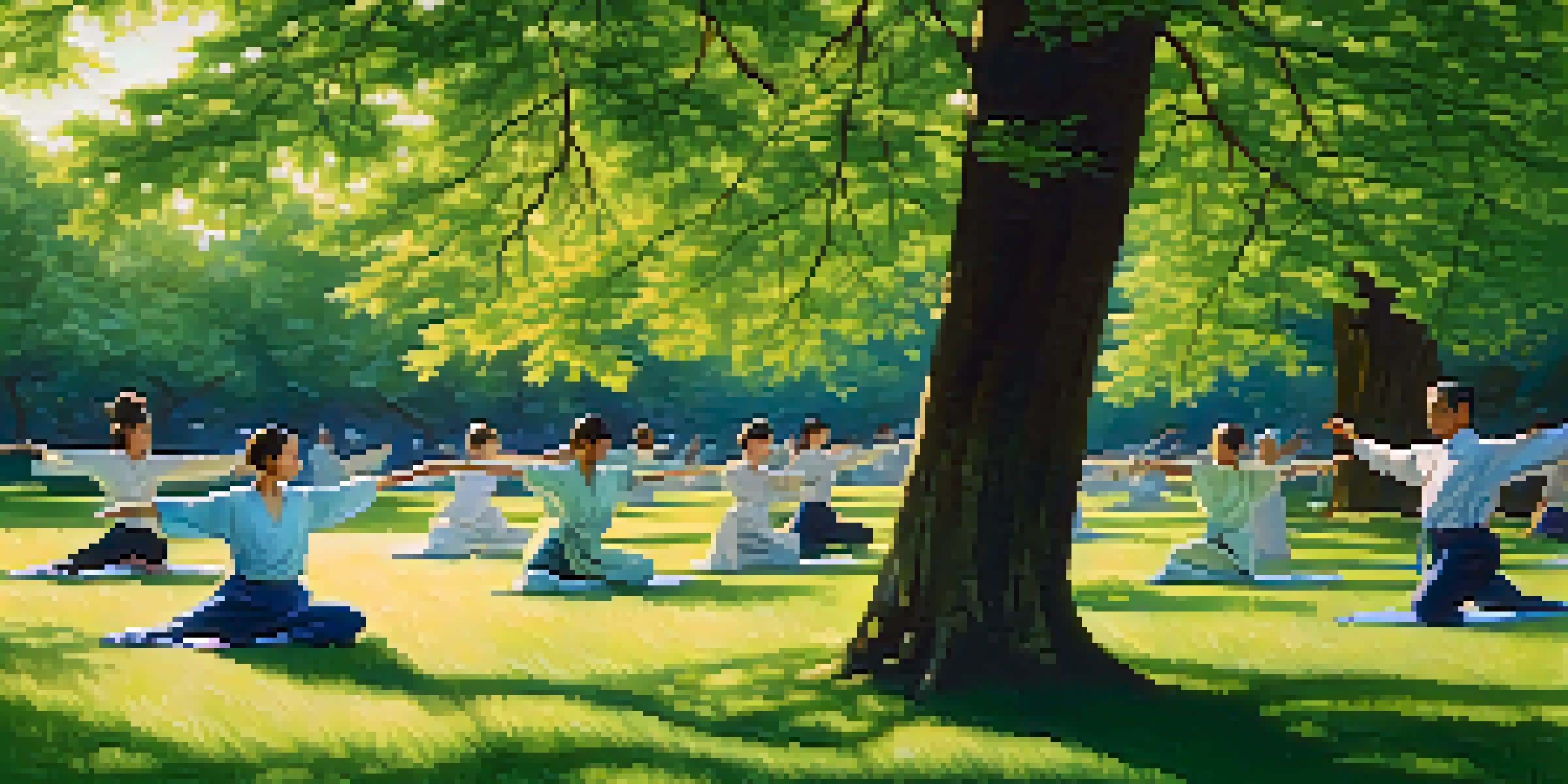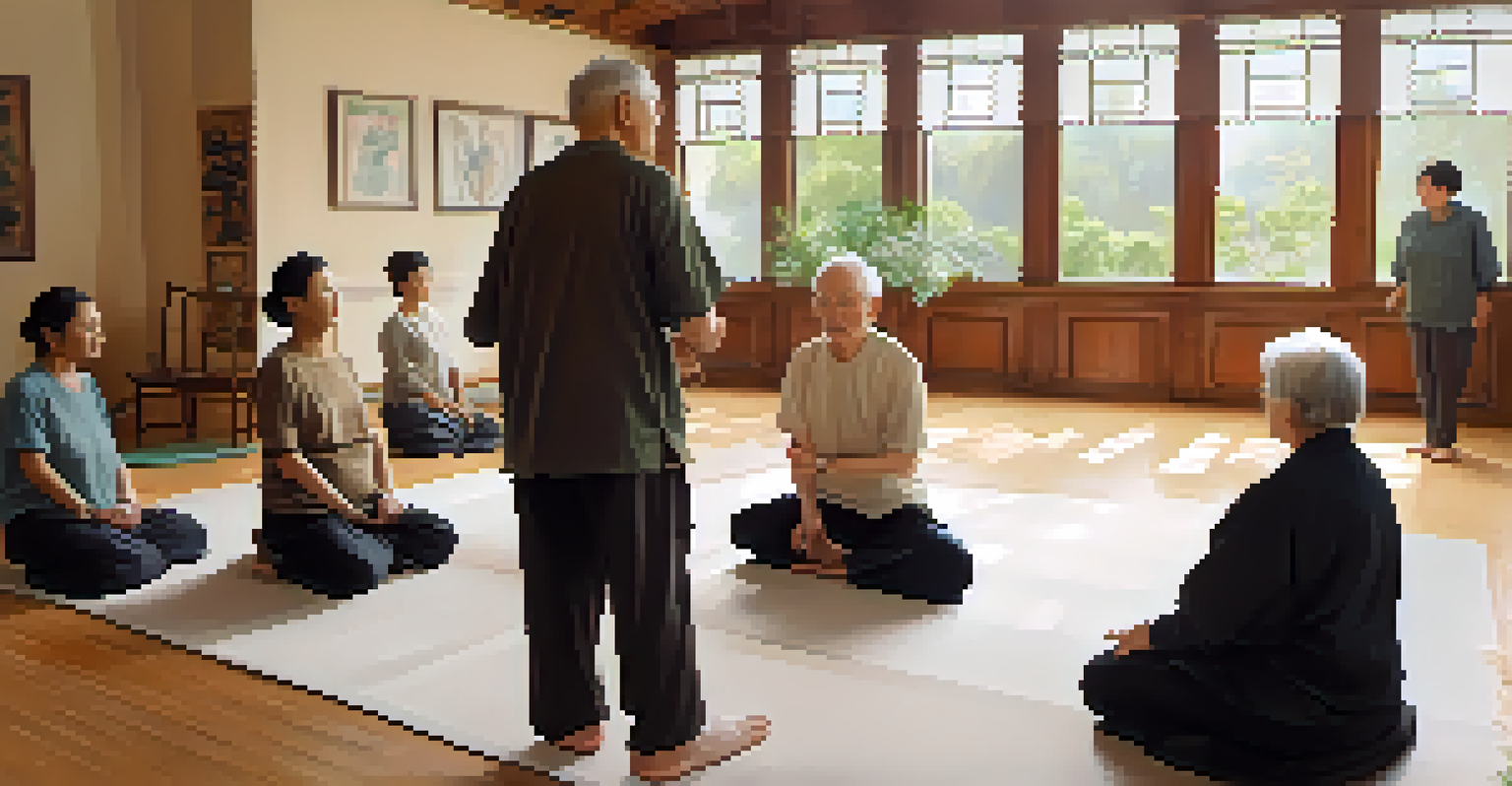Integrating Tai Chi for Holistic Health and Balance

Understanding Tai Chi: A Path to Wellness
Tai Chi, often described as 'meditation in motion,' is an ancient Chinese martial art that combines slow, flowing movements with deep breathing. This practice not only builds strength but also promotes mental clarity and emotional well-being. By integrating Tai Chi into your daily routine, you can achieve a sense of balance that transcends the physical.
Tai Chi is a form of exercise that combines physical movement, breathing techniques, and meditation.
Unlike many high-intensity workouts, Tai Chi emphasizes relaxation and mindfulness, making it accessible to people of all ages and fitness levels. Whether you're a seasoned athlete or a complete beginner, the beauty of Tai Chi lies in its adaptability to individual needs. This inclusivity is a key reason why it has gained popularity worldwide.
Moreover, Tai Chi is rooted in the philosophy of achieving harmony with nature and oneself, which encourages practitioners to connect with their inner selves. This holistic approach not only fosters physical health but also nurtures emotional resilience, creating a comprehensive pathway toward wellness.
The Physical Benefits of Tai Chi
One of the most significant advantages of practicing Tai Chi is its ability to improve physical health. Research has shown that regular Tai Chi practice can enhance flexibility, balance, and muscle strength, reducing the risk of falls and injuries, especially among older adults. The gentle, flowing movements promote joint health and can alleviate chronic pain conditions.

In addition to enhancing physical strength, Tai Chi also improves cardiovascular health by promoting better circulation and reducing blood pressure. As you practice the slow, controlled movements, your heart rate stabilizes, providing an excellent workout without the strain associated with more vigorous exercises. This makes Tai Chi a fantastic option for those looking to maintain their health without excessive physical stress.
Tai Chi Enhances Physical Health
Regular practice improves flexibility, balance, and muscle strength, significantly reducing the risk of falls and injuries.
Furthermore, Tai Chi encourages mindfulness, which can lead to healthier lifestyle choices. As practitioners become more attuned to their bodies and their movements, they often find themselves making better dietary and exercise choices, contributing to overall well-being. This interconnectedness of mind and body is one of the hallmarks of holistic health.
Mental Clarity: Tai Chi and Mindfulness
Practicing Tai Chi is not just about physical movements; it also significantly boosts mental clarity and focus. The concentration required to perform the slow, deliberate motions can help clear the mind of distractions, leading to improved cognitive function. This aspect of Tai Chi is especially beneficial in today’s fast-paced world where mental clutter is common.
In Tai Chi, the mind is the leader, and the body follows. The breath is the bridge between the two.
Engaging in Tai Chi encourages a state of mindfulness, where practitioners learn to be present in the moment. This mindfulness practice can help alleviate stress and anxiety, which are often exacerbated by our busy lifestyles. By grounding ourselves in the present, we can cultivate a more peaceful state of mind, enhancing our overall mental health.
Moreover, the rhythmic breathing associated with Tai Chi contributes to mental relaxation. As you synchronize your breath with your movements, the body naturally enters a state of calm. This can lead to greater emotional stability, allowing practitioners to handle life's challenges with poise and confidence.
Emotional Balance through Tai Chi
Tai Chi serves as a powerful tool for emotional balance, helping individuals manage stress and cultivate inner peace. The gentle, flowing movements create a sense of tranquility, allowing practitioners to release pent-up emotions and tension. This release is crucial for emotional well-being, especially in times of stress.
Through the practice of Tai Chi, individuals often develop greater self-awareness. As you become more in tune with your body and emotions during practice, you can identify stressors and triggers in daily life. This awareness fosters emotional resilience, empowering you to respond to challenges rather than react impulsively.
Mindfulness Boosts Mental Clarity
The concentration involved in Tai Chi fosters mindfulness, helping to alleviate stress and improve cognitive function.
Additionally, the community aspect of Tai Chi cannot be overlooked. Group classes provide a supportive environment where individuals can connect with others, share experiences, and foster friendships. This social interaction enhances emotional health and creates a sense of belonging, which is vital for holistic well-being.
Integrating Tai Chi into Daily Life
Incorporating Tai Chi into your daily routine can be simple and rewarding. You don't need to set aside hours; even just 10-15 minutes of practice each day can yield significant benefits. Start by setting aside a quiet space where you can focus on your movements, free from distractions.
Many resources are available to help you get started, including online classes, community workshops, and instructional videos. Consider joining a local Tai Chi group to connect with others who share your interest. This not only enhances your practice but also provides additional motivation and support.
As you integrate Tai Chi into your life, remember to be patient with yourself. Like any skill, mastery takes time and practice. Celebrate small victories along the way, and enjoy the journey of discovering how Tai Chi enhances your health and balance.
Overcoming Common Misconceptions About Tai Chi
Despite its many benefits, several misconceptions about Tai Chi may deter potential practitioners. One common belief is that Tai Chi is only for the elderly or those with physical limitations. In reality, people of all ages and fitness levels can benefit from its practice, adapting movements to their abilities.
Another misconception is that Tai Chi lacks intensity and is simply a form of gentle stretching. While it does promote relaxation, Tai Chi is a robust workout that builds strength, balance, and coordination. By engaging in Tai Chi regularly, practitioners can experience significant physical improvements, debunking the myth that it is merely 'easy exercise.'
Emotional Balance Through Movement
Tai Chi promotes emotional resilience by encouraging self-awareness and providing a supportive community for practitioners.
It's also worth noting that Tai Chi is not just about physical movements; it's a comprehensive practice that encompasses mental and emotional health. By addressing these misconceptions, more individuals can discover the transformative power of Tai Chi and incorporate it into their wellness journey.
The Future of Tai Chi in Holistic Health Practices
As more people seek holistic approaches to health and well-being, Tai Chi is poised to play a significant role in modern wellness practices. The growing recognition of the mind-body connection has sparked interest in integrating Tai Chi into various health programs, including rehabilitation and mental health treatments. This trend highlights the need for comprehensive care that addresses physical, mental, and emotional aspects of health.
Incorporating Tai Chi into conventional medical settings is becoming more common, with healthcare professionals recommending it for stress management and chronic pain relief. This shift indicates a broader acceptance of alternative therapies and their efficacy in promoting holistic health. As research continues to support these benefits, Tai Chi may find itself further integrated into mainstream wellness strategies.

Ultimately, the future of Tai Chi looks bright as individuals and communities increasingly recognize its potential for fostering health and balance. By embracing this ancient practice, we can cultivate a more harmonious relationship with ourselves and the world around us, ensuring that the benefits of Tai Chi continue to thrive for generations to come.